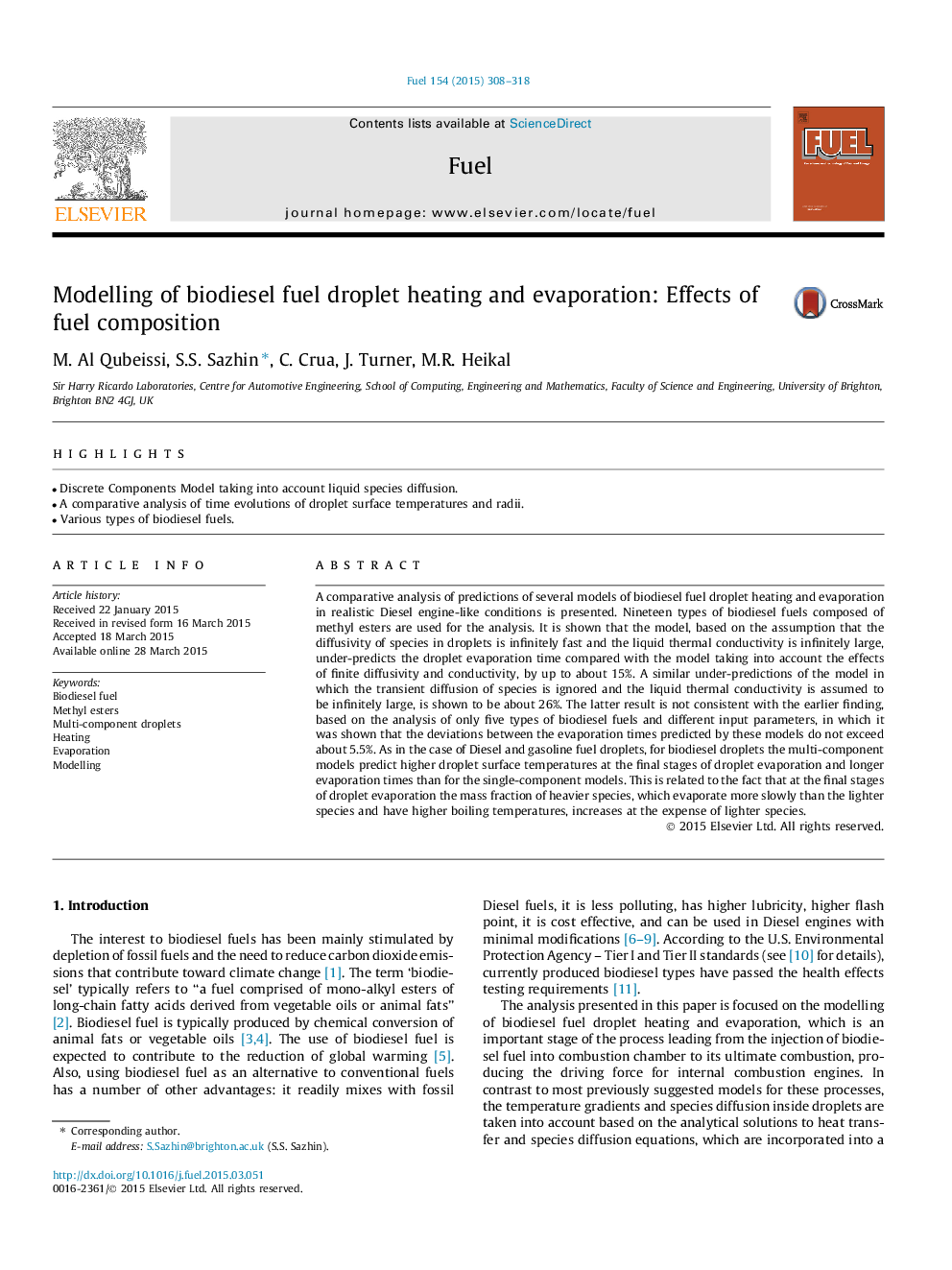| کد مقاله | کد نشریه | سال انتشار | مقاله انگلیسی | نسخه تمام متن |
|---|---|---|---|---|
| 6635508 | 461115 | 2015 | 11 صفحه PDF | دانلود رایگان |
عنوان انگلیسی مقاله ISI
Modelling of biodiesel fuel droplet heating and evaporation: Effects of fuel composition
ترجمه فارسی عنوان
مدل سازی سوخت قطره سوخت بیودیزل و تبخیر: اثر ترکیب سوخت
دانلود مقاله + سفارش ترجمه
دانلود مقاله ISI انگلیسی
رایگان برای ایرانیان
کلمات کلیدی
سوخت بیودیزل، متیل استرها، قطرات چند جزء، گرمایش تبخیر، مدل سازی،
ترجمه چکیده
تجزیه و تحلیل تطبیقی پیش بینی های چندین مدل از حرارت دادن قطرات سوخت بنزین سوخت و تبخیر در شرایط موتور دیزلی واقع بینانه ارائه شده است. نهال نوع سوخت بیودیزل متشکل از متیل استرها برای تجزیه و تحلیل استفاده می شود. نشان داده شده است که مدل براساس این فرضیه که انتشار پراکندگی گونه ها در قطره ها بی نهایت سریع است و هدایت حرارتی مایع بی نهایت بزرگ است، زمان تخلیه قطره را در مقایسه با مدل پیش بینی می کند و با توجه به اثرات انتشار محدود شده و هدایت، تا حدود 15٪ است. تقریبا مشابه پیش بینی های مدل که در آن انتشار تداوم گونه ها نادیده گرفته می شود و هدایت حرارتی مایع به اندازه بی نهایت بزرگ است، نشان می دهد حدود 26 درصد است. نتیجه نهایی با یافته های قبلی، بر اساس تجزیه و تحلیل تنها پنج نوع سوخت های بیودیزل و پارامترهای ورودی متفاوت است که نشان می دهد انحراف بین زمان های تبخیر شده پیش بینی شده توسط این مدل ها در حدود 5.5٪ تجاوز نمی کند. همانطور که در مورد قطرات سوخت دیزل و بنزین، برای قطرات بیودیزل، مدل های چند جزء، دمای بالاتر قطره را در مراحل نهایی تبخیر قطره و زمان تبخیر بیشتر، نسبت به مدل های تک مولد، پیش بینی می کنند. این مربوط به این واقعیت است که در مراحل نهایی تبخیر قطرات، مقدار توده ای از گونه های سنگین تر که به آرامی از گونه های سبک تر تبخیر می شود و دارای درجه حرارت جوش بالاتر است، به هزینه های گونه های سبک تر افزایش می یابد.
موضوعات مرتبط
مهندسی و علوم پایه
مهندسی شیمی
مهندسی شیمی (عمومی)
چکیده انگلیسی
A comparative analysis of predictions of several models of biodiesel fuel droplet heating and evaporation in realistic Diesel engine-like conditions is presented. Nineteen types of biodiesel fuels composed of methyl esters are used for the analysis. It is shown that the model, based on the assumption that the diffusivity of species in droplets is infinitely fast and the liquid thermal conductivity is infinitely large, under-predicts the droplet evaporation time compared with the model taking into account the effects of finite diffusivity and conductivity, by up to about 15%. A similar under-predictions of the model in which the transient diffusion of species is ignored and the liquid thermal conductivity is assumed to be infinitely large, is shown to be about 26%. The latter result is not consistent with the earlier finding, based on the analysis of only five types of biodiesel fuels and different input parameters, in which it was shown that the deviations between the evaporation times predicted by these models do not exceed about 5.5%. As in the case of Diesel and gasoline fuel droplets, for biodiesel droplets the multi-component models predict higher droplet surface temperatures at the final stages of droplet evaporation and longer evaporation times than for the single-component models. This is related to the fact that at the final stages of droplet evaporation the mass fraction of heavier species, which evaporate more slowly than the lighter species and have higher boiling temperatures, increases at the expense of lighter species.
ناشر
Database: Elsevier - ScienceDirect (ساینس دایرکت)
Journal: Fuel - Volume 154, 15 August 2015, Pages 308-318
Journal: Fuel - Volume 154, 15 August 2015, Pages 308-318
نویسندگان
M. Al Qubeissi, S.S. Sazhin, C. Crua, J. Turner, M.R. Heikal,
